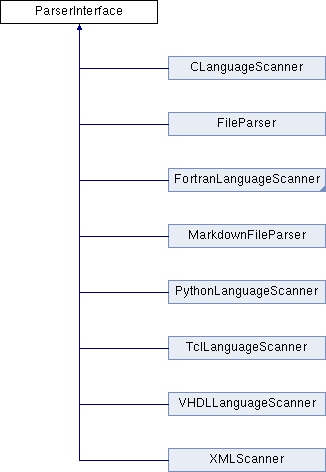|
My Project
|
|
My Project
|
Abstract interface for programming language parsers. More...
#include <parserintf.h>

Public Member Functions | |
| virtual | ~ParserInterface () |
| virtual void | startTranslationUnit (const char *fileName)=0 |
| virtual void | finishTranslationUnit ()=0 |
| virtual void | parseInput (const char *fileName, const char *fileBuf, Entry *root, bool sameTranslationUnit, QStrList &filesInSameTranslationUnit)=0 |
| virtual bool | needsPreprocessing (const QCString &extension)=0 |
| virtual void | parseCode (CodeOutputInterface &codeOutIntf, const char *scopeName, const QCString &input, SrcLangExt lang, bool isExampleBlock, const char *exampleName=0, FileDef *fileDef=0, int startLine=-1, int endLine=-1, bool inlineFragment=FALSE, MemberDef *memberDef=0, bool showLineNumbers=TRUE, Definition *searchCtx=0, bool collectXRefs=TRUE)=0 |
| virtual void | resetCodeParserState ()=0 |
| virtual void | parsePrototype (const char *text)=0 |
Abstract interface for programming language parsers.
By implementing the methods of this interface one can add a new language parser to doxygen. The parser can make use of the comment block parser to parse the contents of special comment blocks.
Definition at line 38 of file parserintf.h.
|
inlinevirtual |
Definition at line 41 of file parserintf.h.
|
pure virtual |
Called after all files in a translation unit have been processed.
Implemented in VHDLLanguageScanner, PythonLanguageScanner, CLanguageScanner, FortranLanguageScanner, MarkdownFileParser, TclLanguageScanner, XMLScanner, and FileParser.
Referenced by parseFiles().
|
pure virtual |
Returns TRUE if the language identified by extension needs the C preprocessor to be run before feed the result to the input parser.
Implemented in VHDLLanguageScanner, PythonLanguageScanner, CLanguageScanner, FortranLanguageScanner, MarkdownFileParser, TclLanguageScanner, XMLScanner, and FileParser.
Referenced by parseFile().
|
pure virtual |
Parses a source file or fragment with the goal to produce highlighted and cross-referenced output.
| [in] | codeOutIntf | Abstract interface for writing the result. |
| [in] | lang | The programming language of the code fragment. |
| [in] | scopeName | Name of scope to which the code belongs. |
| [in] | input | Actual code in the form of a string |
| [in] | isExampleBlock | TRUE iff the code is part of an example. |
| [in] | exampleName | Name of the example. |
| [in] | fileDef | File definition to which the code is associated. |
| [in] | startLine | Starting line in case of a code fragment. |
| [in] | endLine | Ending line of the code fragment. |
| [in] | inlineFragment | Code fragment that is to be shown inline as part of the documentation. |
| [in] | memberDef | Member definition to which the code is associated (non null in case of an inline fragment for a member). |
| [in] | showLineNumbers | if set to TRUE and also fileDef is not 0, line numbers will be added to the source fragement |
| [in] | searchCtx | context under which search data has to be stored. |
| [in] | collectXRefs | collect cross-reference relations. |
Implemented in VHDLLanguageScanner, PythonLanguageScanner, CLanguageScanner, FortranLanguageScanner, MarkdownFileParser, TclLanguageScanner, XMLScanner, and FileParser.
Referenced by MarkdownFileParser::parseCode(), parseCode(), FileDef::parseSource(), DocbookDocVisitor::visit(), ManDocVisitor::visit(), RTFDocVisitor::visit(), XmlDocVisitor::visit(), LatexDocVisitor::visit(), HtmlDocVisitor::visit(), writeDocbookCodeBlock(), MemberDef::writeDocumentation(), Definition::writeInlineCode(), FileDef::writeSource(), VhdlDocGen::writeSource(), and writeXMLCodeBlock().
|
pure virtual |
Parses a single input file with the goal to build an Entry tree.
| [in] | fileName | The full name of the file. |
| [in] | fileBuf | The contents of the file (zero terminated). |
| [in,out] | root | The root of the tree of Entry *nodes representing the information extracted from the file. |
| [in] | sameTranslationUnit | TRUE if this file was found in the same translation unit (in the filesInSameTranslationUnit list returned for another file). |
| [in,out] | filesInSameTranslationUnit | other files expected to be found in the same translation unit (used for libclang) |
Implemented in VHDLLanguageScanner, PythonLanguageScanner, CLanguageScanner, FortranLanguageScanner, MarkdownFileParser, TclLanguageScanner, XMLScanner, and FileParser.
Referenced by parseFile().
|
pure virtual |
Callback function called by the comment block scanner. It provides a string text containing the prototype of a function or variable. The parser should parse this and store the information in the Entry node that corresponds with the node for which the comment block parser was invoked.
Implemented in VHDLLanguageScanner, PythonLanguageScanner, XMLScanner, CLanguageScanner, FortranLanguageScanner, MarkdownFileParser, TclLanguageScanner, and FileParser.
Referenced by MarkdownFileParser::parsePrototype().
|
pure virtual |
Resets the state of the code parser. Since multiple code fragments can together form a single example, an explicit function is used to reset the code parser state.
Implemented in VHDLLanguageScanner, PythonLanguageScanner, CLanguageScanner, XMLScanner, FortranLanguageScanner, MarkdownFileParser, TclLanguageScanner, and FileParser.
Referenced by parseCode(), FileDef::parseSource(), MarkdownFileParser::resetCodeParserState(), writeDocbookCodeBlock(), MemberDef::writeDocumentation(), Definition::writeInlineCode(), FileDef::writeSource(), and writeXMLCodeBlock().
|
pure virtual |
Starts processing a translation unit (source files + headers). After this call parseInput() is called with sameTranslationUnit set to FALSE. If parseInput() returns additional include files, these are also processed using parseInput() with sameTranslationUnit set to TRUE. After that finishTranslationUnit() is called.
Implemented in VHDLLanguageScanner, PythonLanguageScanner, CLanguageScanner, FortranLanguageScanner, MarkdownFileParser, TclLanguageScanner, XMLScanner, and FileParser.
Referenced by parseFiles().